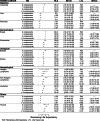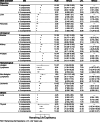The effect between metabolic syndrome and life expectancy after cancer diagnosis: Catalan cohort study
- PMID: 39825260
- PMCID: PMC11740694
- DOI: 10.1186/s12889-025-21437-9
The effect between metabolic syndrome and life expectancy after cancer diagnosis: Catalan cohort study
Abstract
This study examines remaining life expectancy (RLE) after a cancer diagnosis, focusing on age, sex, cancer type, and metabolic syndrome (MS) components, using data from the SIDIAP database in Catalonia (2006-2017). RLE was analyzed for 13 cancer types, stratified by sex and MS components. The cohort study includes 183,364 individuals followed from diagnosis until death, transfer, or study end (December 2017). RLE at age 68 (median diagnosis age) was calculated based on MS components (0, 1, 2, and ≥ 3). Men aged 68 with 0 MS components had an RLE of 13.2 years, compared to 8.9 years for those with ≥ 3 MS. Women had an RLE of 15.9 years with 0 MS components versus 11.4 years with ≥ 3 MS. RLE varied by cancer type, with the highest RLE in men seen in prostate cancer and in women in non-Hodgkin lymphoma. The lowest RLE for both sexes was in pancreatic cancer. The largest differences between 0 and ≥ 3 MS components were observed in non-Hodgkin lymphoma and the smallest in pancreatic cancer. Increased MS components were associated with reduced RLE in at least 8 cancer types for men and 9 for women. Prevention strategies targeting MS components could increase RLE in cancer patients.
Keywords: Cancer; Metabolic syndrome; Remaining life expectancy; Survival.
© 2025. The Author(s).
Conflict of interest statement
Declarations. Ethics approval and consent to participate: This study adheres to both national and international guidelines, including the Declaration of Helsinki and Principles of Good Research Practice. In compliance with European and Spanish laws regarding confidentiality and data protection ([EU] 2016/679), all data within SIDIAP is consistently pseudo-anonymized. Hence, obtaining consent from the participants was deemed unnecessary and was waived by the Clinical Ethics Committee at IDIAPJGol. To establish a connection with the CMBD database, SIDIAP utilizes a third-party service to maintain confidentiality. Approval for the study protocol was granted by the Clinical Research Ethics Committee of IDIAPJGol (P17/212) on November 29, 2017. Anonymity and confidentiality of data and medical records were ensured throughout, following the guidelines outlined in the Organic Law 15/1999 on the Protection of Personal Data ( http://www.boe.es/boe/dias/1999/12/14/pdfs/A43088-43099.pdf ). Consent for publication: Not applicable. Competing interests: The authors declare no competing interests.
Figures
Similar articles
-
Association between metabolic syndrome and 13 types of cancer in Catalonia: A matched case-control study.PLoS One. 2022 Mar 4;17(3):e0264634. doi: 10.1371/journal.pone.0264634. eCollection 2022. PLoS One. 2022. PMID: 35245317 Free PMC article.
-
Exploring the association between metabolic syndrome, its components and subsequent cancer incidence: A cohort study in Catalonia.Cancer Med. 2024 Aug;13(16):e7400. doi: 10.1002/cam4.7400. Cancer Med. 2024. PMID: 39149842 Free PMC article.
-
Lifestyle risk factors and residual life expectancy at age 40: a German cohort study.BMC Med. 2014 Apr 7;12:59. doi: 10.1186/1741-7015-12-59. BMC Med. 2014. PMID: 24708705 Free PMC article.
-
Social Determinants of Remaining Life Expectancy at Age 60: A District-Level Analysis in Germany.Int J Environ Res Public Health. 2022 Jan 29;19(3):1530. doi: 10.3390/ijerph19031530. Int J Environ Res Public Health. 2022. PMID: 35162553 Free PMC article.
-
Estimating the change in life expectancy after a diagnosis of cancer among the Australian population.BMJ Open. 2015 Apr 13;5(4):e006740. doi: 10.1136/bmjopen-2014-006740. BMJ Open. 2015. PMID: 25869684 Free PMC article.
References
-
- Xia B, He Q, Pan Y, Gao F, Liu A, Tang Y, Chong C, Teoh AYB, Li F, He Y, Zhang C, Yuan J. Metabolic syndrome and risk of pancreatic cancer: a population-based prospective cohort study. Int J Cancer. 2020;147(12):3384–93. - PubMed
-
- Engin A. The definition and prevalence of obesity and metabolic syndrome. Adv Exp Med Biol. 2017;960:1–17. - PubMed
MeSH terms
Grants and funding
LinkOut - more resources
Full Text Sources
Medical





